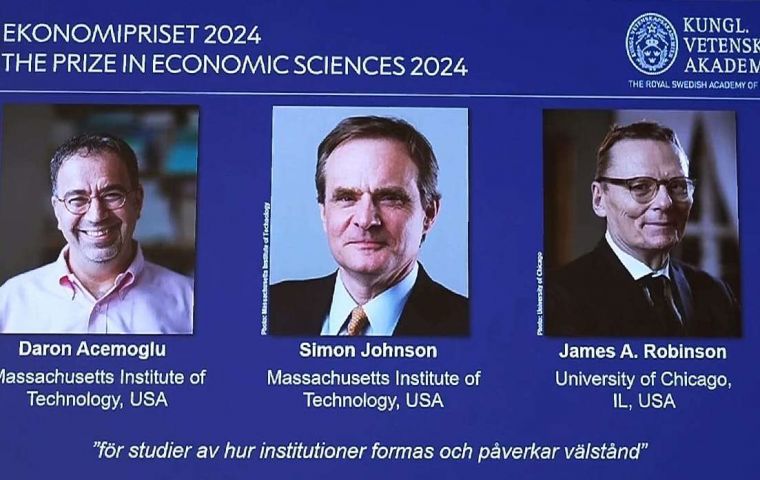MercoPress. South Atlantic News Agency
Trio granted Economics Nobel Prize for delving into development asymmetries
 This year's winners came as no surprise within Economics circles
This year's winners came as no surprise within Economics circles Three researchers who delved into the asymmetries of how countries prosper differently were awarded the Economics Nobel Prize Monday, thus closing this year's round of announcements ahead of the Dec. 10 award ceremonies in Stockholm.
The Bank of Sweden Prize in Economic Sciences in Memory of Alfred Nobel, first awarded in 1969, is the only one not foreseen in the philanthropist's will. Since Economics was added way later than Medicine, Physics, Chemistry, Literature, and Peace, it was also referred to as the nickname “fake Nobel.” Last year's winner was the American Claudia Goldin, for her studies on women in the labor market.
In 2024, the € 970,000 went to Turkish-American Daron Acemoglu and British-Americans Simon Johnson and James A. Robinson “for their studies on how institutions are formed and how they affect prosperity,” it was explained. “The winners have shown the importance of institutions in achieving this goal,” said Jakob Svensson, who chairs Nobel's Economics Committee. It has been “demonstrated that the initial differences in colonial institutions are an important explanation for the vast differences in prosperity that we see today,” the Academy stressed based on the winning study.
“Reducing the enormous differences in income between countries is one of the greatest challenges of our time,” he added. “By studying the different political and economic systems introduced by European colonizers around the world, the three academics have demonstrated a relationship between institutions and prosperity,” the committee also noted.
Acemoglu, Johnson, and Robinson examined Europeans’ colonization of large parts of the globe. “Institutions that were created to exploit the masses are bad for long-run growth, while ones that establish fundamental economic freedoms and the rule of law are good for it,” the committee also argued. Hence, diverse and inclusive societies such as those in North America and Europe are more prosperous than those in the Global South.
“I'm delighted. It's surprising and incredible news,” the 57-year-old Acemoglu said when told about the news. He and 61-year-old Johnson hold teaching positions at the Massachusetts Institute of Technology (MIT) while Robinson, 64, is a professor at the University of Chicago.
Acemoglu had been a big favorite for the award for years thanks to the book “Why Nations Fail” he co-authored with Robinson. Hence, his victory came as no surprise in Economics circles.




Top Comments
Disclaimer & comment rulesCommenting for this story is now closed.
If you have a Facebook account, become a fan and comment on our Facebook Page!